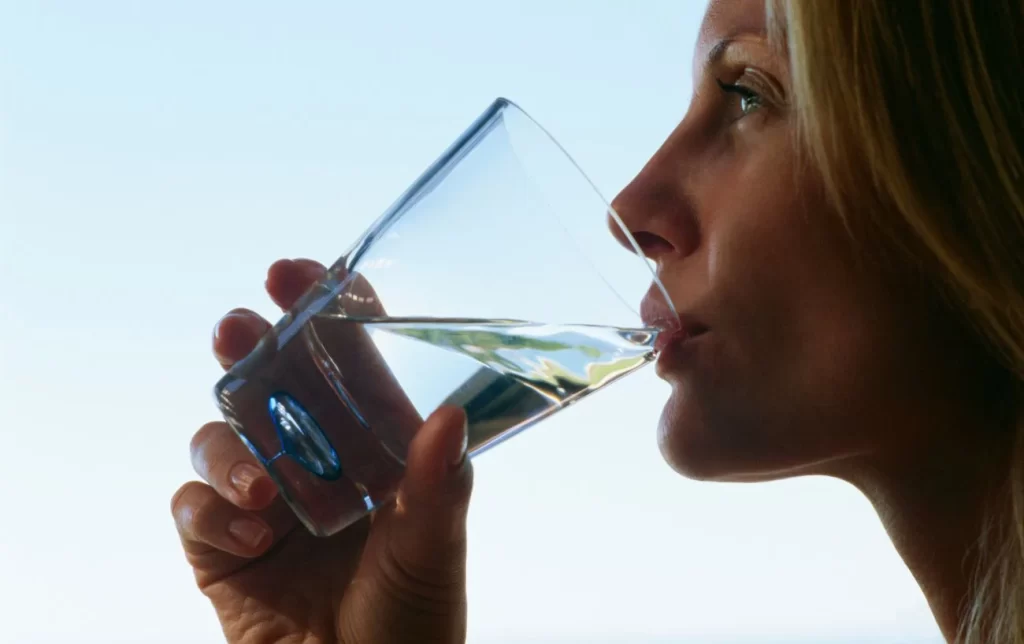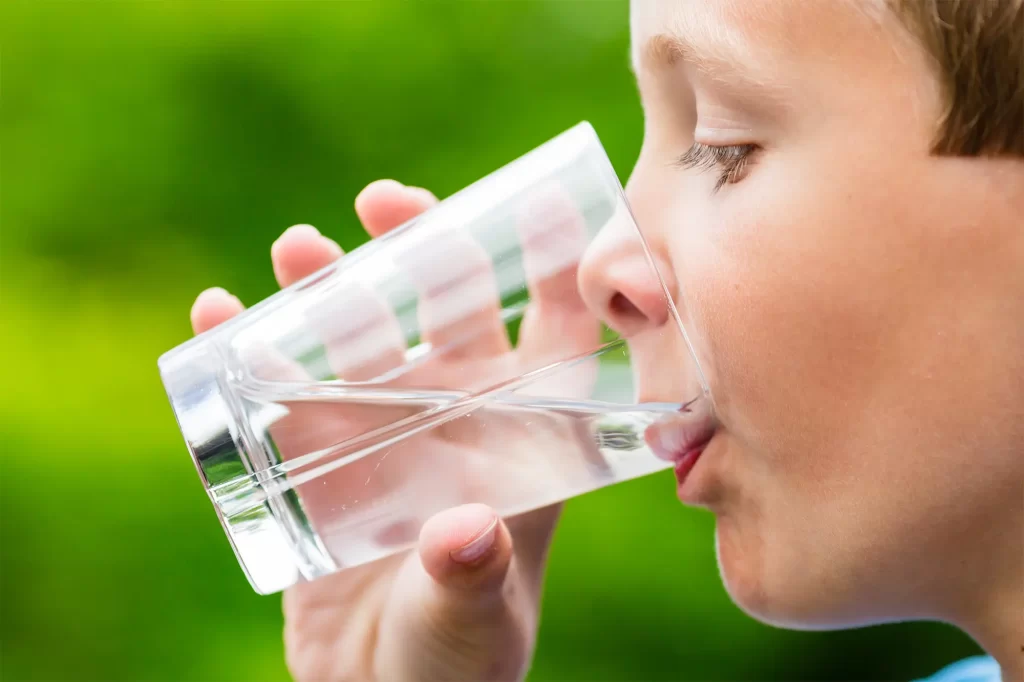
Young woman drinking purified water
Share this

Water serves more than just a thirst-quenching purpose, it also helps the body flush out toxins and aid in weight management. Recent research has even suggested that staying hydrated may be a key factor in longevity and anti-aging. On the other hand, not drinking enough water can lead to elevated serum sodium levels, increasing the risk of chronic conditions such as stroke, heart failure, and cognitive impairment.
What type of water is best for our health, and how can we ensure optimal hydration in our daily lives?
According to modern medicine, the human body is composed of approximately 60 percent water. Nutrients from foods, such as vitamins and minerals, need to dissolve in water to circulate in the blood and reach various organs. Water also plays a role in improving the body’s metabolism and eliminating waste.
Dehydration and insufficient water intake can cause more than just thirst. They can also result in fatigue, anxiety, depression, poor concentration, restless sleep, and breathing difficulties. Moreover, dehydration can lead to the development of many diseases, including chronic inflammation, chronic pain, constipation, high blood pressure, and diabetes. Even obesity caused by overeating may be linked to dehydration in the body. For some patients, the solution to their ailments may be as simple as increasing their water intake.
According to the latest research from the National Institutes of Health, staying hydrated to maintain normal serum sodium levels may be a key factor in promoting longevity and anti-aging. Conversely, elevated serum sodium levels may increase the risk of various chronic diseases.
In a study that tracked 11,255 individuals for 25 years and excluded participants with high serum sodium levels due to factors such as obesity and medication use, researchers found that even when serum sodium levels were within the normal range of 135 to 146 mmol/l, those with higher levels had an increased risk of being biologically older and developing chronic diseases at a younger age.


Can drinking water help prevent a stroke?

Drinking more water may help prevent a stroke.
Many studies have proven that proper hydration at the time of a stroke is linked to better stroke recovery.
It is possible that dehydration causes blood to be thicker. Viscous blood causes the body to retain sodium and increases blood pressure.
Drinking enough water regularly prevents dehydration. This may play a role in keeping the blood less viscous, which in turn prevents a stroke. However, this does not mean overhydrating is a healthy habit. Drinking too much water may be dangerous too, especially in people with heart and kidney conditions. Also, drinking water during stroke symptoms may cause choking, so caution needs to be exercised.
A stroke occurs due to the obstruction of blood flow to the brain. Two types of strokes obstruct the blood flow to the brain.
- Ischemic stroke: This type of stroke occurs due to the formation of clots.
- Hemorrhagic stroke: This type of stroke results in bleeding of the brain.
Some irreversible factors, such as age and family history, are likely to increase the risk of a stroke.
What are other ways to prevent a stroke?
Here are several other ways to start reining in your risks today to prevent a stroke, before the stroke attacks
- Treating hypertension: Hypertension is the most potent risk factor for a stroke. It increases the risk of a stroke by two- to four-fold before the age of 80. Hypertension thickens the artery walls and leads to the deposition of cholesterol or other fats to form plaques. High blood pressure can weaken the arteries and can make them burst, leading to hemorrhagic stroke. Several methods to control high blood pressure include
- Maintaining a proper weight
- Avoiding drugs that raise blood pressure
- Cutting down on salt
- Eating fruits and vegetables to increase potassium levels
- Exercising more
- Monitoring and controlling blood pressure
- Quitting cigarette smoking: Cigarette smoking causes a two-fold increase in the risk of ischemic stroke and a four-fold increase in the risk of hemorrhagic stroke. Cigarette smoking can increase the risk of a stroke in the following ways
- Build-up of fatty substances in the carotid artery (central neck artery) supplying blood to the brain increases the risk of a stroke.
- Nicotine from the cigarette raises blood pressure and carbon monoxide in the smoke reduces the oxygen supply to the brain.
- It thickens the blood leading to clot formation.
- It promotes aneurysm formation.
Medications or therapy may help a patient quit cigarette smoking.
- Manage your heart: Some heart disorders can result in blood clots that may break loose and block vessels leading to the brain, which include
- Atrial fibrillation (irregular heartbeat)
- Enlargement of one of the heart’s chamber
- Coronary artery disease
- Valve defects
Medications, medical procedures and surgery can treat these disorders.
- Limit alcohol: High alcohol content can raise blood pressure and triglycerides. Limiting alcohol to one glass per day can help reduce the side effects. Drinking wine once a day can protect the heart and brain as it has resveratrol.
- Treat diabetes: Diabetes can damage the blood vessels over time, leading to clot formation inside the blood vessels. It can increase the risk of a stroke by two to four times. High blood sugar management involves
- Regularly monitoring blood sugar levels
- Taking antidiabetic medications
- Exercise more: Exercise helps reduce both weight and blood pressure. Exercise at a moderate intensity at least five times a week.
- Walk daily for 30 minutes.
- Use the stairs instead of the elevators.
- When you exercise, exercise until you breathe hard.
- If you cannot exercise for 30 minutes continuously, break it up into 10- to 15-minute sessions a few times each day.
- Cut cholesterol levels: High cholesterol can clog the arteries and lead to heart attack or stroke. Diet, exercise and cholesterol-lowering medications may keep the cholesterol level in check.
Compared to normal serum sodium levels, serum sodium levels above 142 mmol/l are associated with a 64 percent increased risk of developing chronic diseases such as stroke, heart failure, atrial fibrillation, peripheral vascular disease, chronic lung disease, diabetes, and cognitive impairment.
Staying Hydrated Can Help Prevent Illnesses
In ancient China, there was a saying that “Food is better than medicine, but water is even better than food.” Water was regarded as the “king of medicines,” and almost all traditional Chinese medical texts placed water as the first remedy. For example, in the Compendium of Materia Medica, the first item listed was water. Similarly, the first chapter of a renowned dietary therapy book called Recipe of Suixiju, authored by the Qing dynasty physician Wang Shixiong, was also dedicated to water. This demonstrates the importance of water in the eyes of ancient Chinese medical practitioners.
Four Considerations to Keep in Mind When Drinking Water for Optimal Health
In the present day, many individuals fail to consume enough water. This is largely due to the fact that modern people tend to favor milk, fruit juice, and sugary beverages, which are different from water in terms of their effects on the body’s functions. They cannot effectively replace water and do not provide adequate hydration. Additionally, some people choose to consume coffee, tea, or alcohol in place of water. However, these beverages possess strong diuretic effects, which may take away more water from the body and cause dehydration.
Drinking plain water is the best option for maintaining good health, and there are also certain considerations to keep in mind when it comes to drinking water for health purposes.
1. Water temperature
The temperature of the water should be around the same as body temperature. Drinking water that is too hot can harm the throat and even lead to oral cancer. On the other hand, water that is too cold can affect blood circulation.
2. Timing of water intake
It is recommended to drink more water in the afternoon between 3 to 5 pm. During this period, the bladder meridian is active, and the body can efficiently utilize water to aid in metabolism and detoxification.
Some people have the habit of drinking a large glass of water in the morning. However, this may not be suitable for those with spleen deficiency. If you wish to drink water on an empty stomach in the morning, it is advisable to limit your intake to only 50 ml to nourish the body.
3. Boiling water
It is not advisable to drink unboiled water as it can make the body cold and increase the risk of illness. It must be boiled before consumption.
Water boiled in different containers has different tastes. Among stainless steel kettles, cast iron kettles, and pottery kettles, water boiled in a pottery kettle has the most pleasant taste, characterized by a warm and smooth texture.
4. Amount of water to drink
Not everyone has to strictly adhere to drinking 8 glasses of water a day. The amount of water one should consume each day is influenced by various factors, such as climate, metabolic rate, gender, age, food intake, type of work, and physical condition. The general recommendation is to drink 6 to 10 cups of water (approximately 250 ml per cup), which amounts to about 1,500 to 2,400 ml per day.
Patients who cannot urinate normally, such as those with heart or kidney disease or edema, must follow their doctor’s instructions and should not drink excessive amounts of water indiscriminately.
Natural Water is Better than Processed Water: Only Two Filtering Steps Required
In recent years, many brands of processed water have emerged on the market. These manufacturers claim that their products have gone through multiple purification processes and offer various medical benefits. This has made it difficult for consumers to decide which water to purchase. However, the reality is that purified water is not necessarily better than natural water.
For example, while alkaline ionized water can be beneficial to the human body, consuming it for a prolonged period may be detrimental to one’s health. This type of water is cool in nature, making it suitable for individuals who have a damp-heat constitution or excessive internal heat. However, people with a yang-deficiency constitution may find that drinking alkaline water exacerbates their condition.
Reverse osmosis (RO) water is another popular type of water that uses the RO technique to extract pure water and remove minerals. There is a common misconception that the body’s daily requirement for minerals and trace elements should come from food rather than drinking water. However, the truth is that drinking water actually provides the body with 20 percent of the necessary minerals and trace elements each day. When pure water enters the body, it can dissolve minerals and trace elements from the bones or other parts of the body, leading to a gradual depletion of these essential nutrients and causing symptoms of kidney qi (vital energy) deficiency.
When consuming these types of purified water, it is crucial to always examine whether they are truly beneficial to the body, rather than blindly trusting the claims made by marketers. As a general rule, any drinking water that is not in its natural state is not conducive to human health in the long run.
In fact, drinking tap water at home is the best choice for our health. Before consumption, you only need to go through two simple filtration processes: first, using activated carbon to remove odor and impurities, and second, filtering out toxic substances and bacteria.
Ultimately, it is best to prioritize simplicity and naturalness when it comes to taking care of our bodies.






